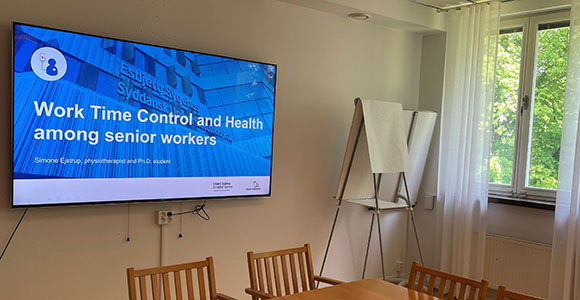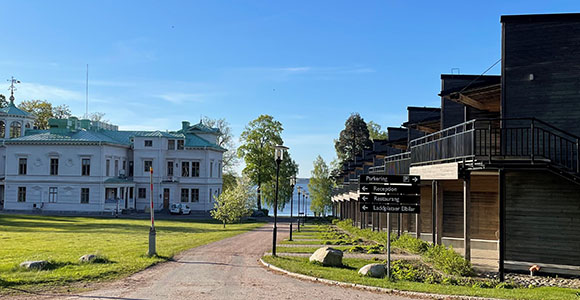
How to expand your academic network with a research stay abroad
How Simone found new academic energy in Sweden: Even short research stays abroad can help grow your academic network and strengthen your research – and they’re possible, even with small children.
PhD student Simone Ejstrup recently returned from a one-month research stay at the University of Gävle in Sweden.
– In my everyday work, I’m part of an endocrinology research unit, so I don’t have many colleagues working in the same field. At the University of Gävle (Högskolan i Gävle), they have an internationally recognised research group focusing on occupational health research. That’s why I chose to go there, says Simone Ejstrup.
Simone is a trained physiotherapist and holds a Master’s degree in physiotherapy. She’s currently working on her PhD project.

– My research focuses on work ability and physical capacity among senior workers – including how Work Time Control is associated with physical performance, she explains.
The collaboration was set up through her principal supervisor, who had previously worked with one of the professors in Gävle.
An opportunity to engage with peers in the same field
The primary aim of Simone’s stay in Sweden was to collaborate on a joint publication – her focus throughout the visit.
– A publication is always valuable, but what truly made the stay worthwhile was the shared interest in the research area, says Simone Ejstrup.
– It was incredibly rewarding to discuss my research with peers. I’ve become more confident in academic discussions, because they knew the field so well and could ask questions from a completely different perspective.
3 tips for planning a research stay abroad
Don’t overthink it – just go. Even if you’re unsure, take the plunge. A stay abroad brings fresh inspiration and new perspectives to your research.
Make time for the practicalities. Finding the right accommodation can take longer than you think. Because our stay was short, we avoided a lot of paperwork – and my husband was already on parental leave, which helped.
Explore more than just the research. Make room for the experience. Take time to discover the local culture and surroundings – it’s not just about the research.
After returning home, Simone presented her findings and data to her research unit, which also benefitted from the new insights. She’s also noticed that her positive experience has inspired other PhD students.
– I’ve shown that a research stay abroad is possible, she says.
A hotel apartment turned out to be the perfect fit
Simone brought her husband and their two young children, aged three and a half and nine months. The timing worked well, as the trip coincided with her husband’s parental leave, so he didn’t need to take any time off.
– Being in Sweden was a big advantage. The short distance made it easier for the grandparents to visit – and we could bring our own car, says Simone Ejstrup.

The university didn’t offer any accommodation, but Simone and her family came up with a practical solution.
– I spent a long time searching Airbnb for a flat in the city, but eventually I found a hotel apartment just outside the centre. It had several rooms, a kitchen and a spacious bathroom, she explains.
– It also made it easier to host visitors – we could simply book an extra room for the grandparents.
Because the stay was short, there were fewer administrative hurdles. The family didn’t need visas or have to register a change of address – which made the whole process much simpler.
Balancing clinical work and research
Taking time out for a research stay abroad can be a challenge when, like Simone Ejstrup, you also have clinical responsibilities. But she and her workplace found a practical solution.
– We agreed that I’d be away for four weeks of full-time research – and in return, I’d work full-time in the clinic during the summer holidays, says Simone Ejstrup.
Under normal circumstances, her week is split between four days of research and one day of clinical work.
Since returning to Denmark, Simone has continued working on the joint publication and expects to submit it by the end of the year. The stay in Gävle was an investment in both her academic development and her professional network – and proof that even short-term stays can make a real difference.
Funding
If you're planning a short stay abroad, be aware that some foundations have minimum duration requirements. Simone Ejstrup financed her stay using a combination of external funds and a grant from the PhD School's mobility scheme.
Meet the researcher
Simone Ejstrup is a PhD student at the Research Unit of Endocrinology at IRS Esbjerg and Grindsted Hospital. She researches work ability and physical capacity among senior workers.